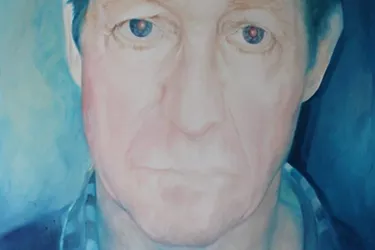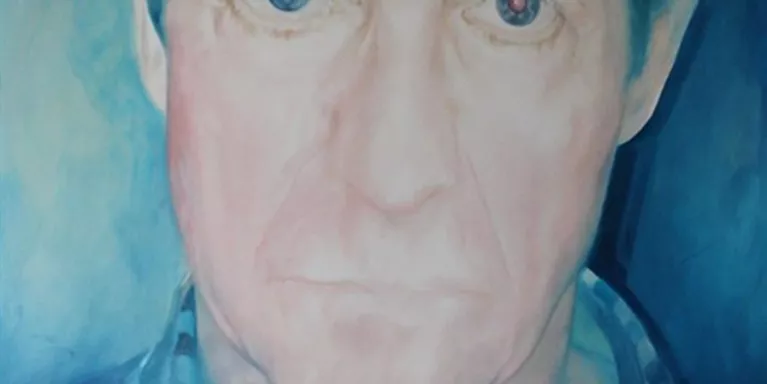Depression: sharing my story
Andy Baddeley is a two-time Olympian and Britain’s number one 1,500m runner. He blogs about his experiences of depression.
Sometimes it's hard to get out of bed in the morning. It shouldn't be – I have a beautiful wife and an amazing baby daughter. They make me happier than I can express here without both boring and sickening you in one fell swoop. But still, sometimes, inexplicably, it's hard to do simple things.
It's a ludicrously hard thing to admit to feeling depressed, especially when I have no way of quantifying it. Am I depressed enough, or am I simply dealing with feelings and anxiety that everyone experiences? They don't complain, so what gives me the right to feel self-pity? I don't know the answers to those questions, but I do know that it feels like a weakness to admit it. As a sportsperson, mentality is the key to success. I pride myself on my mental toughness – I feel like I have dealt incredibly well with some very challenging situations, in life and in the sport that I love.
Athletics' beauty is in its simplicity. It is completely objective. Cross the line first. Run the fastest time. But what happens when you don't cross the line first or run the fastest time? There have been plenty of occasions for me where that has been the case, as there have for every athlete out there. Sometimes I've made poor decisions, sometimes I've not been fit enough and sometimes there have been injury problems – all things that I am responsible for, but not necessarily things that I have wanted to, or felt able to explain.
I'm a private person, something which is difficult to reconcile with a job that places me under scrutiny and in the spotlight. Social media provides the opportunity to explain but it can also leave me feeling tremendously and terrifyingly exposed.
I want to share how I have been feeling, in some part to reach out to other people who may feel the same way, but also through a desire for catharsis. But I am simultaneously paranoid about the reaction I will receive – particularly (and most peculiarly) from people I don't know. Should it matter to me what a complete stranger thinks?
"I feel like I have completely lost my identity."
What has led me to this point? The 2012 Olympics were an amazing experience and an incredibly proud achievement, but in the 31 months since the end of the 2012 season, I haven't managed to make the starting line in a single outdoor track race. Injury has meant I haven’t ever been able to train fully throughout that time.
I've had several lengthy conversations with close friends about how it has felt to deal with a serious long term injury, and why it has contributed to my feelings of depression. The best way I can explain it is to ask them to imagine showing up to work every day, but being completely unable to actually carry out that work. Not only this, but not doing their work takes all day, and by the time they get home they are exhausted and frustrated but yet have achieved nothing.
If someone asks me what I do, I tell them that I am a runner. But for the last 31 months, there have been very few days where that self-definition has felt accurate. I feel like I have completely lost my identity. Holding myself up against the training I have been able to do in previous years is one thing that has left me disconsolate and barely able to leave the house.
"I wasn’t ready for the other impossible-to-put-my-finger-on causes of some moments of darkness."
At the end of 2013, after more than 12 months of pain, problems and inconclusive diagnoses, finding out that I had a chronic tear in my hamstring tendon felt like a solution to my problem. It also meant that it felt ok to start again at zero and to compare each day to the last, rather than to days when I was ready to take on the best in the world. All I had to do was focus on “being the best me" each day. I had a plan and could set about tackling it head on.
But I wasn’t ready for the other impossible-to-put-my-finger-on causes of some moments of darkness. These are by far the most frustrating. I like to be able to solve problems, but not being able to pinpoint the problem (or perhaps not being certain that I have a problem deserving of attention) only makes the feelings of helplessness worse.
There have been times when I have been ashamed of the person I seemed to be becoming. The main reason for my self-reproach was a complete inability to distance myself from the athletics world – and in particular the performances of others. I felt angry towards those people who were able to compete, and I wilfully hoped for them to fail. These feelings were quickly replaced with abject guilt - I know first-hand how hard one has to work to succeed, and I should be able to respect the endeavours of others.
It took a close friend calling me a “bitter old man” (amongst other things) to make me face up to the reality of my irrationality. Hearing this from someone I trust was exactly what I needed. I feel like I can hold athletics at a safe distance, allowing me to be more relaxed and objective about watching the sport that I love. I’m now able to be happy for other people and their success, which has lifted a huge burden from my shoulders that I wasn’t even aware I was carrying.
"Making simple choices or getting out of the house takes hours."
On some days I still suffer from crippling indecision, where making simple choices or getting out of the house takes hours for no reason other than procrastination. I still worry about what other people think. I sometimes react nervously to receiving a text message or email in case I have caused someone to think badly of me. But the lowest, most lonely moments – when I would think that it might be better if I had some sort of career ending accident that would take the decisions and heartache out of my hands – don’t really happen anymore.
The injury struggles I’ve described here have culminated in serious knee surgery to repair damaged tendons. The recovery and rehab will be difficult, both mentally and physically, but the moment the anaesthetist asks me to start counting down from 10, will be my new day zero. It will mark the start of my attempt to make the Rio Olympics, however unrealistic that might seem. And I hope that it will allow me to share the details of my recovery, on both the good days and the bad days.
Writing this has helped, and talking to people about it has helped. Talking and trusting close friends continues to help. So that’s the why I am sharing this, because if anybody reads what I have written and it strikes a chord, I hope it encourages them – encourages you - to talk to someone.
- If you're dealing with depression, Mind's info has details on causes, symptoms, treatments, self-help tips and info for friends and family that you might find helpful. Take a look at it here.
-
Our Infoline may be able to help you find support services in your area. Find out how to contact them here.

Read about Mind's telephone helplines

Information and support
When you’re living with a mental health problem, or supporting someone who is, having access to the right information - about a condition, treatment options, or practical issues - is vital. Visit our information pages to find out more.
Share your story with others
Blogs and stories can show that people with mental health problems are cared about, understood and listened to. We can use it to challenge the status quo and change attitudes.

















